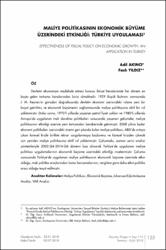| dc.contributor.author | Akıncı, Adil | |
| dc.contributor.author | Yıldız, Fazlı | |
| dc.date.accessioned | 2021-12-12T16:50:03Z | |
| dc.date.available | 2021-12-12T16:50:03Z | |
| dc.date.issued | 2018 | |
| dc.identifier.issn | 1300-1981 | |
| dc.identifier.issn | 2651-351X | |
| dc.identifier.uri | https://app.trdizin.gov.tr/makale/TXpBeU1qTTRPQT09 | |
| dc.identifier.uri | https://hdl.handle.net/20.500.11857/2193 | |
| dc.description.abstract | Devletin ekonomiye müdahale etmesi konusu iktisat literatüründe her dönem en başta gelen tartışma konularından birisi olmaktadır. 1929 Büyük Buhranı sonrasında J. M. Keynes’in görüşleri doğrultusunda devletin ekonomi içerisindeki rolüne yeni bir boyut getirilmiş ve ekonomik büyümenin sağlanmasında maliye politikasına aktif bir rol yüklenmiştir. Daha sonra, 1970’li yıllarda yaşanan petrol fiyatı şokları ve 1980’li yıllarda Avrupa’da uygulanan mali daralma politikaları sonucunda yaşanan gelişmeler, maliye politikasının etkinliği üzerine yeni tartışmaları beraberinde getirmiştir. 2008 yılına kadar ekonomi politikaları içerisindeki önemi geri planda kalan maliye politikası, ABD’de ortaya çıkan küresel krizle birlikte tekrar sorgulanmaya başlanmış ve küresel krizden çıkmak için yeniden maliye politikasına aktif rol yüklenmiştir. Çalışmada, zaman serisi analizi yöntemleriyle 2002:Q4-2014:Q4 dönemi baz alınarak Türkiye’de uygulanan maliye politikası uygulamalarının ekonomik büyüme üzerindeki etkinliği incelenmiştir. Çalışma sonucunda Türkiye’de uygulanan maliye politikasının ekonomik büyüme üzerinde etkin olduğu, mali politika araçlarından kamu harcamalarının, vergilere göre daha etkin politika aracı olduğu tespit edilmiştir. | en_US |
| dc.description.abstract | The issue of government intervention in economy has always been one of the main subjects of discussion in economics. Following the 1929 Great Depression, a new dimension has been brought to the role of government in economy in line with the ideas of J. M. Keynes, and an active role has been given to fiscal policy in achieving the economic growth. Later on, the developments emerging as a result of the oil price shocks of 1970s and the fiscal contraction policies implemented in Europe in the 1980s have led to new debates on the effectiveness of the fiscal policy. Fiscal policy, which remained secondary in importance among the other economic policies until 2008, has become a matter of question with the economic crisis hitting the USA, and a vital importance has been attached to fiscal policy again in order to overcome the crisis. The study analyzes the effectiveness of fiscal policy practices implemented in Turkey on the economic growth on the basis of the period between 2002:Q4 and 2014:Q4 through the time-series analysis method. The findings of the study reveal that the fiscal policy implemented in Turkey is effective on economic growth, and the public expenditures used as a means of fiscal policy are more effective when compared to the compared to taxes. | en_US |
| dc.language.iso | tur | en_US |
| dc.relation.ispartof | Sayıştay Dergisi | en_US |
| dc.rights | info:eu-repo/semantics/openAccess | en_US |
| dc.subject | İşletme Finans | en_US |
| dc.subject | İktisat | en_US |
| dc.subject | Uluslararası İlişkiler | en_US |
| dc.subject | İşletme | en_US |
| dc.subject | Siyasi Bilimler | en_US |
| dc.subject | Kamu Yönetimi | en_US |
| dc.title | MALİYE POLİTİKASININ EKONOMİK BÜYÜME ÜZERİNDEKİ ETKİNLİĞİ: TÜRKİYE UYGULAMASI | en_US |
| dc.title.alternative | EFFECTIVENESS OF FISCAL POLICY ON ECONOMIC GROWTH: AN APPLICATION IN TURKEY | en_US |
| dc.type | article | |
| dc.department | Fakülteler, Uygulamalı Bilimler Fakültesi, Finans ve Bankacılık Bölümü | |
| dc.identifier.volume | 3 | en_US |
| dc.identifier.startpage | 125 | en_US |
| dc.identifier.issue | 110 | en_US |
| dc.identifier.endpage | 156 | en_US |
| dc.relation.publicationcategory | Makale - Ulusal Hakemli Dergi - Kurum Öğretim Elemanı | en_US |



















